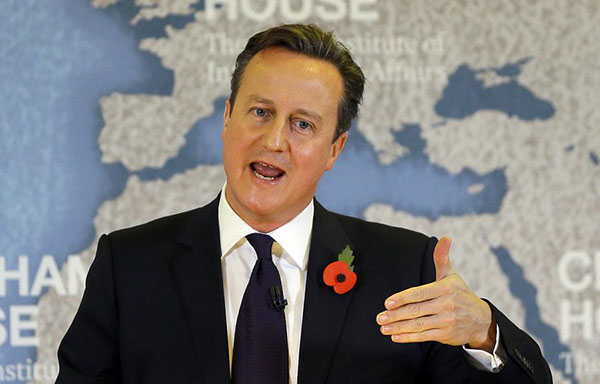 |
|
Britain's Prime Minister David Cameron delivers a speech on EU reform, at Chatham House in London, Britain November 10, 2015. Cameron said he hoped to make good progress with reforms of the European Union when leaders from the bloc meet next month, but he gave no fresh sign of when he plans to hold Britain's EU membership referendum. [Photo/Agencies] |
LONDON - British Prime Minister David Cameron appealed to doubters at home and in other EU capitals on Tuesday to embrace his attempt to reform the 28-member bloc as a chance to boost prosperity rather than writing it off as "Mission Impossible".
Cameron, under pressure after overseeing what critics see as a lacklustre start to the renegotiation of Britain's ties with the European Union, used a speech to offer the most detail yet on four areas where he wants change.
He outlined the strong economic and foreign policy role Britain plays in the EU but said he did not doubt that Britain could survive if its people voted to leave the EU in a referendum by the end of 2017.
Cameron asked for understanding from Eurosceptics at home and from European partners, some of whom have become frustrated with London's demands for change.
"There will be those who say, here and elsewhere in the EU, that we are embarked on 'Mission Impossible'," Cameron told diplomats, reporters and business leaders at the Chatham House think tank in London.
"I do not believe so for a minute ... The European Union has a record of solving intractable problems. It can solve this one too. Let us therefore resolve to do so, because the prize is a big one."
Cameron also sent a letter to Donald Tusk, president of the European Council, setting out his four main objectives to launch what he described as the renegotiation's "formal phase" before a December summit when EU leaders will hammer out the details of Britain's new terms.
Tusk said in Brussels that talks would start next week.
The renegotiation could be difficult, with the question of benefits to EU migrants likely to cause the most trouble.
The EU executive said it saw demands for new limits on the rights of EU citizens working in other member states as "highly problematic".
In his speech, Cameron spelt out what he wanted from Brussels.
He said his demands for financial and economic safeguards for countries outside the 19 member euro zone and for the EU to become more competitive must be legally binding and therefore may require treaty change.
He also called for groups of national parliaments to be able to block European laws, part of his move to make sure Britain is excluded from the principle of "ever closer union".
It will be almost impossible to complete treaty change in two years and would mean several EU states holding referendums which governments fear they would lose as European politics turn increasingly Eurosceptic.
On migration, he said he proposed that people coming to Britain from the EU must live in the country for four years before qualifying for in work benefits or social housing, and that the practice of sending child benefit overseas should stop.
The latter demand could cause the most difficulty in the renegotiation, with EU members, especially in eastern Europe from where hundreds of thousands of people have left for Britain, complaining that it would be discriminatory.